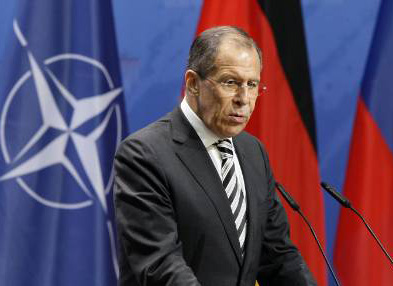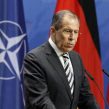
Russia Offers “Mediation Services” in Libya Crisis
Publication: Eurasia Daily Monitor Volume: 8 Issue: 81
By:

Russia is moving fast to gel the stalemate in Libya, pin down the US and NATO there, and exploit their predicament by casting itself as a conflict-resolution facilitator (EDM, April 21).
Moscow is in a hurry because time is not yet on its side. NATO and the US can still escape that protracted-conflict scenario if they succeed in killing Colonel Muammar Gaddafi and his entourage with luckier air strikes than that attempted on April 25; or (failing this) if they mount themselves without delay a decisive operation on the ground (which Russia has made clear that it would condemn).
To entrap the Western allies in a long-term stalemate, Moscow is calling for a cease-fire in place, with mediated negotiations among the Libyan parties to the conflict, and banning all forms of US/NATO military action not authorized by the UN Security Council (i.e., by veto-wielding Russia). Moscow’s most urgent priority is to block any Western military operations, or arming and training insurgents. In Moscow’s interpretation, UN Security Council resolutions no. 1970 and no. 1973 preclude all these forms of Western involvement.
Toward those ends, Russia is now offering its mediation services.
On April 22, Russian President, Dmitry Medvedev, used a telephone call from Greek Prime Minister, Giorgios Papandreou, to convey Russia’s offer of “mediation assistance” in the Libya crisis. According to Medvedev, a solution must urgently be sought, exclusively through peaceful means, and strictly within the UN Security Council’s resolutions and mandate (i.e., precluding further Western military involvement) (www.kreml.ru, Interfax, April 22). On April 14, Medvedev had become the first Russian official to raise strong public objections to the US/NATO intervention in Libya (Interfax, www.kreml.ru, April 14; EDM, April 21). Apparently, the Kremlin used the conversation with Papandreou to convey its message to certain other parties.
On April 23, Russian Minister of Foreign Affairs, Sergei Lavrov, and Libya’s Prime Minister, Baghdadi al-Mahmudi, had a telephone conversation. Al-Mahmudi inquired about possible Russian facilitation of a peaceful political solution. Lavrov and Al-Mahmudi agreed on the main prerequisites: full compliance with the Security Council’s resolutions, an end to strikes on Misurata and all populated localities by all sides, immediate ceasefire, and negotiations to be mediated by the African Union and the United Nations, which Russia is ready to assist. In Moscow’s official readout, the Libyan government fully agrees with all of these points (www.mid.ru, April 24; Interfax, April 25).
According to Moscow’s announcement, the telephone conversation took place at the Libyan side’s request. In Tripoli’s version, it was Lavrov who called Al-Mahmudi (the two versions are not necessarily conflicting). Tripoli’s version corroborates Moscow’s, but seems fuller. It adds, citing Lavrov, that Russia is prepared to contribute observers to a cease-fire monitoring mission in Libya, and it has informed the UN about this. Moscow is also purportedly ready to receive a special envoy from Libya (Al-Jamahiriyah TV, April 23).
Moscow calculates that Western belligerents will either bog down in a protracted stalemate, or alternatively feel compelled to escalate military operations for a decisive outcome. Military escalation would (not only in Russia’s view) again require UN Security Council authorization. This would in turn enable Moscow to seek trade-offs with the United States and NATO on issues unrelated to Libya, but of priority interest to Russia. To ensure a stalemate, Russia has clearly indicated that it would block UN Security Council authorization of offensive operations on the ground, or assistance to insurgents.
Practically on a daily basis, while in Moscow or abroad, Lavrov remonstrates that the US and NATO air strikes are exceeding the UN Security Council’s resolution no. 1973. He has adopted an equidistant tone, chastising all strikes on populated localities, and charging that the Western intervention supports one of the two Libyan parties, instead of being impartial. Moscow further insist that the arms embargo, under Security Council resolution no. 1970, covers non-lethal equipment, as well as military instructors, and applies to Libya’s entire territory [i.e, including Benghazi], “in Russia’s interpretation” (Lavrov). Medvedev, who had set the tone of such remonstrations, returned to the issue when receiving UN Secretary, Ban Ki-Moon, on April 22 in Moscow. The Russian president called for “strict compliance” with the Security Council’s resolutions on Libya, and a “clearer formulation of UN mandates in general” (www.kreml.ru, April 22; www.mid.ru, Interfax, April 22, 25).
Moscow is reserving its position on the key issues of Gaddafi’s personal departure, regime change, and Libya’s territorial unity. Russian statements implicitly suggest a readiness to hold talks with Gaddafi’s government, or mediate between Tripoli and Benghazi, as part of some international effort that could undercut the ongoing Western efforts. Playing a relatively weak hand with consummate skill, Russia will use its UN Security Council veto power to block any decisive Western military action. Moscow’s tactics are indirectly shielding the Tripoli government, while ensuring that the insurgents stay in the fight but only defensively. This is Moscow’s prescription for stalemate in Libya.
However, Russia has not protested too loudly against US/NATO military actions that exceed the UN mandate to some extent. Moscow is signaling that it can accept such actions within certain limits. Almost certainly, it expects in return Western deference to Russian interests elsewhere. In the Afghanistan war and the US-Iran protracted confrontation, Russia has fostered perceptions that the US and NATO “need” Russia strategically.
Ultimately, Russia’s position on Libya will be up for negotiation and trade-offs, at third-parties’ expense in the worst case, if the stalemate becomes chronic. With NATO’s credibility recklessly on the line, Moscow will exploit a situation in which the Alliance bogs down and expends its scarce resources in Libya.
US and NATO involvement in the Libya conflict was haphazard and, in many ways, irrational from the outset. At this point, however, decisive military action on the ground is the only way for the US and NATO to avoid a “frozen conflict” on African soil.




